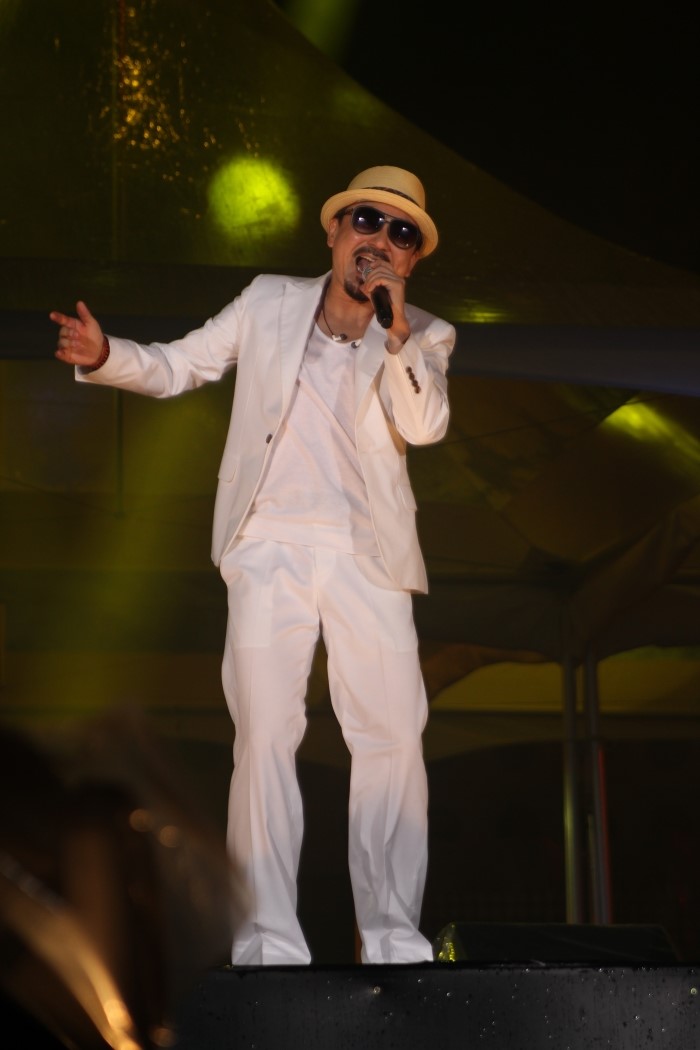1. Overview
Park Sang-min (박상민Bak Sang-minKorean; born May 2, 1964) is a prominent South Korean singer, lyricist, composer, and concert stage director. Born 박덕만Park Deok-manKorean, he is also known by the nickname "Killer Leon." He is recognized for his distinctive rock music and for his signature look featuring sunglasses and a fedora. His career, spanning from underground activities in the mid-1980s to an official debut in 1993, has yielded numerous hit songs, including "멀어져간 사람아" (Meoreojyeogan Sarama), "청바지 아가씨" (Cheongbaji Agassi), "무기여 잘 있거라" (Mugiye Jal Itgeora), and "해바라기" (Haebaragi). Park Sang-min has received several accolades, such as the SBS Gayo Daejeon Main Prize and the Golden Disc Awards Pavv Popularity Award. Beyond his musical endeavors, he has a notable presence in television broadcasts and holds the position of Vice President for the mixed martial arts organization Road FC.

2. Life and Education
Park Sang-min's personal background, early life, and academic journey laid the foundation for his diverse career in music and other fields.
2.1. Childhood and School Days
Park Sang-min was born Park Deok-man on May 2, 1964, in Pyeongtaek, South Korea. He attended local schools in Pyeongtaek, graduating from Pyeongtaek Jungang Elementary School in February 1977, Han Gwang Middle School in February 1980, and Han Gwang High School in February 1983.
2.2. Education and Academic Background
Following his high school graduation, Park Sang-min briefly pursued studies abroad. In August 1983, he attempted to study in Japan at the 東京音楽大学Tokyo Ongaku DaigakuJapanese (Tokyo College of Music) in the Practical Music Department, but he returned to South Korea after approximately one year. He later earned a bachelor's degree in Ceramics Engineering from Hongik University in 1994.
2.3. Early Activities
Before his official debut as a mainstream singer, Park Sang-min was active in the underground music scene. He first debuted as a rock singer in 1984, performing in underground live clubs near Hongdae in Dongsung-dong, Seoul. From 1985 to 1986, he gained recognition as an underground rocker, particularly in areas like Sincheon-dong in Gongju, Chungcheongnam-do, and Jungchon-dong in Jung-gu, Daejeon. After completing his military service, he prepared for his official entry into the music industry. During this period, he became known by his nickname "Killer Leon."
3. Music Career and Achievements
Park Sang-min's music career is marked by a series of successful albums and singles that established him as a prominent figure in the Korean rock scene, earning him several awards and widespread popularity.
3.1. Debut and Heyday
Park Sang-min officially debuted as a singer in 1993 with his first album, Start. Although his debut album did not initially receive widespread acclaim, it featured notable songs such as "빛바랜 시간속에" (Bitbaraen Sigansoge). He gained significant recognition through his rendition of "너에게로 가는 길" (Neoegeuro Ganeun Gil), which served as the theme song for the popular Japanese manga series, Slam Dunk.
His career truly took off in 1994 with the release of his second album. The title track, "멀어져간 사람아" (Meoreojyeogan Sarama), a remake of a 1991 song by the rock band 자유JayuKorean, gained immense popularity, marking the beginning of his heyday. This album achieved sales of approximately 400,000 copies and peaked at second place on broadcast music charts. In 1995, his third album, featuring the track "청바지 아가씨" (Cheongbaji Agassi), further solidified his popularity, selling around 300,000 copies and reinforcing his status in the music industry.
In 1997, Park Sang-min released his fourth album, two years after his previous work. The song "무기여 잘 있거라" (Mugiye Jal Itgeora) from this album was particularly well-received by audiences for its narrative-like lyrics and upbeat rhythm; the album also included "애원" (Aewon). However, despite the success of two songs from his fifth album in 1998, namely "하나의 사랑" (Hanaui Sarang) and "비원" (Biwon), he experienced a career slump thereafter. His 2001 album Romanticism featured the song "상실" (Sangsil).
He returned to the music scene in 2002 as the vocalist for the Gwangbokjeol Band. His career saw a significant resurgence in 2004 with the song "해바라기" (Haebaragi), which notably sampled The Beatles' "Let It Be". This song became highly popular, especially among middle-aged audiences, successfully re-establishing his career. In 2006, he released "눈물잔" (Nunmuljan) from the album 서랍속 이야기 (Seorapsok Iyagi), and in 2007, "서른이면" (Seoreunimyeon). In 2011, he continued to make an impact in the music industry with "한 사람을 위한 노래" (Hansaram-eul Wihan Norae). His participation in MBC's reality show I Am a Singer 2 in 2012 further helped him maintain his popularity. Throughout his early career, Park Sang-min became recognizable for his signature look, consistently wearing sunglasses and a fedora, which captured public attention.
3.2. Discography
Since his 1993 debut with the album Start, Park Sang-min has released a total of 13 studio albums and 6 single albums up to 2022.
3.2.1. Studio Albums
- Start (1993)
- Vol.2 (1994)
- RETURN TO SELF? (1995)
- 화산 (Hwasan) (1997)
- THE ROAD (1998)
- 폭풍 (Pokpung) (1999)
- Romanticism (2001)
- Feel (2002)
- Sunflower (January 28, 2005)
- 서랍속 이야기 (Seorapsok Iyagi) (2006)
- 울지마요 Don't Cry (Uljimayo Don't Cry) (2007)
- 니가 그리운 날엔 (Niga Geuriun Naren) (February 24, 2009)
- Special Edition 비가와요 (Biga Wayo) (June 26, 2009)
- 일 더하기 삼 (Il Deohagi Sam) (August 23, 2010)
3.2.2. Single Albums
- 다 잊은채로 (Da Ijeunchaero) (2005)
- 서른이면 (Seoreunimyeon) (2007)
- 눈물속愛 (Numulsok Ae) (2008)
- 한사람을 위한 노래 (Hansaram-eul Wihan Norae) (2011)
- 툭툭털어 (Tuktuk Teoreo) (2011)
- Faction (Digimon Ghost Game opening / With Ri Su-bin) (September 23, 2022)
3.3. Awards and Honors
Throughout his career, Park Sang-min has received several significant awards and achieved first place on music programs.
- 2004: SBS Gayo Daejeon Main Prize
- 2004: 19th Golden Disc Awards Pavv Popularity Award
- 2007: 2nd Korea Model Awards Popularity Award
- 2010: 6th Korea Knowledge Management Awards Culture and Arts Grand Prize
3.3.1. Music Program 1st Place
| Year | Award Details (Total 1) |
|---|---|
| 2004 (Total 1) |
|